Completed evaluations
-an-invasive-alien-species-in-the-chilean-patagonia.tmb-th600x450.png?Culture=en&sfvrsn=e78f3f76_1)
Terminal evaluation of the project “Strengthening and development of instruments for the management, prevention and control of beaver (Castor canadensis), an invasive alien species in the Chilean Patagonia”
08/12/2023
The project, funded by GEF, aimed to improve the institutional frameworks for the control, prevention and management of the invasive exotic species in high value ecosystems for biodiversity in the Magellan region and Chilean Antarctica. In addition, the project tried to address the conservation of biodiversity in the management of productive landscapes.
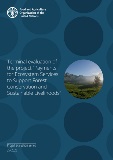
Terminal evaluation of the project “Payments for Ecosystem Services to Support Forest Conservation and Sustainable Livelihoods”
27/11/2023
Key recommendations involve: flagging the most promising communities for national authorities as potential grant applicants under the REDD+ programmes; preparing an exit plan for the four districts that benefit from the project to ensure minimum technical follow-up in the supported communities; and systematizing the approach, experience and good results achieved with the practices of the beekeeping and savings and credit groups to reinforce the project’s learning dimension.
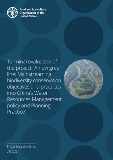
Terminal evaluation of the project “A new green line: Mainstreaming biodiversity conservation objectives and practices into China’s Water Resources Management Policy and Planning Practice”
20/11/2023
The evaluation recommended replicating activities and practices in pilot provinces; finalizing the sustainability plan; ensuring that reporting and evidence clearly address targets and are prepared in a timely manner; adopting a systematic and transparent approach to the regular reassessment of environmental and social impacts; and establishing a bird monitoring system along the Chuan River.
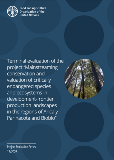
Terminal evaluation of the project “Mainstreaming conservation and valuation of critically endangered species and ecosystems in development-frontier production landscapes in the regions of Arica y Parinacota and Biobío”
16/11/2023
The project was highly relevant to the Government of Chile by as it is aligned with national priorities in environmental matters. In addition to promoting the development of public policy instruments aimed at knowledge and protection of the Arica hummingbird, the Darwin fox, the huemul and the queule, the project carried out a important effort in training and raising awareness about the importance of biodiversity among officials, farmers and schoolchildren.
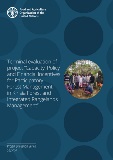
Terminal evaluation of project “Capacity, Policy and Financial Incentives for Participatory Forest Management in Kirisia Forest and Integrated Rangelands Management”
14/11/2023
The participatory forest management project was implemented through a partnership between FAO, the Kenya Forest Service, the Kenyan Wildlife Service, Samburu County Government, Kenya Forestry Research Institute, Community Forest Associations and the Suyian Trust. The evaluation assesses the extent to which the project’s global environmental objective and development objective were realized.
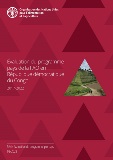
Evaluation of the FAO Country Programme in the Democratic Republic of the Congo 2017–2022
07/11/2023
The evaluation seeks to assess FAO's strategies in the DRC and their contributions to rebuilding livelihoods, improving food security as well as issues and challenges related to the operationalization of the humanitarian and development nexus and FAO's contribution to peacekeeping. Evaluation also has an accountability function vis-à-vis FAO management, the Government, partners and various stakeholders, including the beneficiary populations. (in French)

Evaluation of FAO’s country programme in Ghana 2018‒2022
28/09/2023
In 2022, the FAO Office of Evaluation conducted its first country programme evaluation in Ghana covering the period between 2018 and 2022. The evaluation makes six recommendations, which includes FAO strengthening its presence and sights in Ghana and developing explicit corporate policies and tools for effective operations in low-middle-income countries.
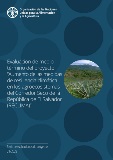
Mid-term evaluation of the project "Upscaling climate resilience measures in the Dry Corridor agroecosystems of El Salvador (RECLIMA)"
28/09/2023
RECLIMA continues to be strategically aligned to national priorities and responds to the adaptation and resilience needs of producers. Some systemic limits to achieving the desired paradigm shift were identified due to the multi-causal complexity of the target populations’ vulnerability. Some challenges were identified in areas of institutional coordination and communication with national partners.

Evaluation of the project "Strengthening institutions and capacity of the Ministry of Agriculture and State Veterinary Inspection Service for Policy Formulation"
12/09/2023
Acknowledging FAO’s comparative advantage in assisting the initiation of agrarian reform, the evaluation makes a number of recommendations for a successful policy reform, which include continuing to work closely with all involved ministries and stakeholders at all levels, to guide and steer the process from the start through endorsement; alongside a systematic approach to capacity building and training for involved ministries.
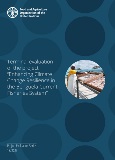
Terminal evaluation of the project "Enhancing Climate Change Resilience in the Benguela Current Fisheries System"
12/09/2023
The key lessons learned were on challenges of implementing joint projects in countries with different political economies, importance of national working groups in the coordination of national climate change activities, need to train country coordinators in project and budget management, monitoring and evaluation, communications, and the importance of embedding project into focal ministries/departments for sustainable transitions.
